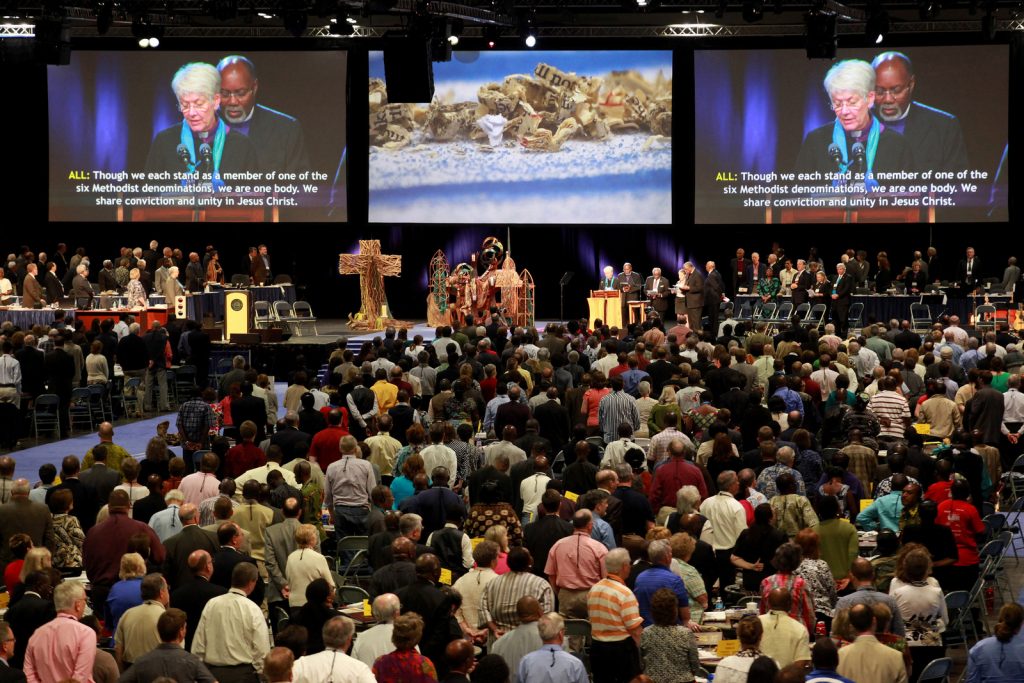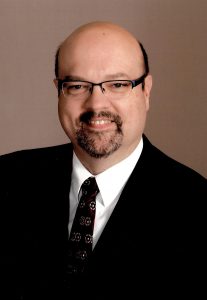
Feb. 28. By Debbie Griffin. The United Methodist Church General Conference has voted 53 percent to 47 percent to strengthen the church rules against same-sex marriage and “self-avowed practicing” gay clergy, tapping a powder keg of emotion locally and internationally.
But sources acknowledge that the decision doesn’t equate to a lot of drastic changes right away since they won’t be finalized until the next general conference in 2020. The proposed changes in rules must also clear a Judicial Council that meets in April.
After implementation, some church leaders wonder if the decision will actually have any bite since many acknowledge there is already open defiance of the rules.
The new, proposed rules say punishment for offending clergy should be a year’s suspension without pay for the first offense and possibly loss of credentials for the second offense, according to UMC.org. The church has about 12.6 million lay members. Some 7 million of those are in the United States and the remaining members are across Africa, Asia and Europe. The general conference is made up of about 900 church officials and lay delegates. The vote in favor of the “Modified Traditional Plan” was Feb. 26.
The UMC General Conference identified the need at a 2016 conference to clarify the church’s stance on human sexuality. After that, a 32-person “Commission on a Way Forward” was appointed by bishops.
The commission was tasked with examining every paragraph in the UMC’s “Book of Discipline” concerning human sexuality and exploring options to “maintain and strengthen the unity of the church.” The Way Forward commission began meeting in January 2017 and presented options at the recent special session.
Members examine consciences, hearts

MARLOWE
Rev. Jonathan Marlowe at the Mt. Zion United Methodist Church in Cornelius facilitated a special meeting at the church Feb. 27. He also wrote a piece for the church newsletter:
“Mt. Zion United Methodist Church will continue to love everyone who comes through our doors. This is not an option. It is a clear command of Jesus. We are to love all of our neighbors, even those who are different – especially those who are different. It doesn’t matter what race they are; it doesn’t matter what sexual orientation they have. It doesn’t matter how old they are, or where they come from, or how much money they have, or what their political affiliations are. Everyone in our community is to be welcomed, loved, respected, cherished, and treated with dignity — because they were created in the image of God, as we all were. This is non-negotiable. Are gay people welcome in our church? Of course they are! We cannot imagine it being any other way.”
The church has been a spiritual centerpiece of Cornelius for almost 200 years. Nowadays, mainstream churches struggle with doctrine and shrinking membership rolls. The Pew Research Center’s 2014 Religious Landscape Study says only 14.7 percent of U.S. adults are part of the mainline Protestant tradition – a sizable decline from 2007, when the last such study was conducted.
Among Millennial adults, only 11 percent are mainline Protestants, 16 percent are Catholics, 21 percent are evangelical Protestants and 35 percent are religiously unaffiliated.
UMC church leaders in the Piedmont say “much is unknown” going forward but not much is likely to change in the short-term. “The Judicial Council of the Church will need to suggest how to bring those parts of the plans in alignment with the constitution of the church. Those details will be worked out and will not make large changes in the overall tenor of this plan,” one member of the UMC clergy said.
The plan by its design was deemed “the least unifying,” suggesting some members and some churches may part ways before anything becomes official.
The vote comes at a time when survey numbers, general sentiment and other religions point to increased acceptance of people whose sexuality is lesbian, gay, bisexual, transgender or questioning (LGBTQ).
Area pastors suggest that congregants consider what their actions could mean to the church before making any decisions around funding or memberships.
On Facebook one Methodist minister stated: “I trust anyone associated with our church right now feels loved and valued by us, who choose to be here. You are loved for who you are. I hope you place your relationships with one another at this church as a deep sign of trust and want to worship and continue to be in ministry together.”
Views include a range of perspectives
Votes at the conference took place by secret ballot but demonstrated that nearly half of the church’s representation is not comfortable loosening any standards. A New York Times article on the conference decision quickly accumulated in excess of 700 comments. Here are some pro-decision excerpts from them:
A Russian woman in the article is quoted as saying she is uncomfortable with the progressive nature of American Methodists. She said anything that prevents people from complying with rules of the creator should be avoided, such as same-sex relationships that don’t allow procreation.
Another comments that with inclusiveness comes diversity and church members should “live with it.” Several reports on the conference refer to the statistical number of UMC members in Africa, where in some places, homosexuality is considered criminal
What next? What now?
Church leaders say they will talk more about the conference in church and make it known that “God’s love is for all people.”
“We are committed to loving everyone, including our gay friends and neighbors in the days ahead. Our bishop is supposed to make a video in response to the general conference. It is to be released on Friday, and we will share it with the congregation at that time,” Marlowe said.
In response to questions, he explained that the Judicial Council is like the UMC’s Supreme Court, and average citizens don’t typically have an opportunity to provide input to the Council.
Marlowe said anyone is always welcome to come and share thoughts with their pastor.
He said the most important parts of Christian discipleship are lived at the local level, and observed, “We do not look to General Conference to inspire us or teach us about Jesus. GC is necessary for our policy and administration, but where we really feel the work of the Holy Spirit is in our local church and in missions and in sharing the love of Jesus with people in our neighborhoods.”



